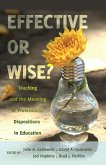Efforts to improve mathematics education have led educators and researchers to not only study the nature of proficiency, beliefs, and practices in mathematics learn¬ing and teaching, but also identify and assess possible influences on students' and teachers' proficiencies, beliefs, and practices in learning and teaching mathematics. The complexity of these topics has fascinated researchers from various back¬grounds, including psychologists, cognitive or learning scientists, mathematicians, and mathematics educators. Among those researchers, two scholars with a similar background - Alan Schoenfeld in the United States and Günter Törner in Germany, are internationally recognized for their contributions to these topics. To celebrate their 65th birthdays in 2012, this book brought together many scholars to reflect on how their own work has built upon and continued Alan and Günter's work in mathematics education. The book contains 17 chapters by 33 scholars from six different education systems. This collection describes recent research and provides new insights into these topics of interest to mathematics educators, researchers, and graduate students who wish to learn about the trajectory and direction of research on these issues.
Dieser Download kann aus rechtlichen Gründen nur mit Rechnungsadresse in A, B, BG, CY, CZ, D, DK, EW, E, FIN, F, GR, HR, H, IRL, I, LT, L, LR, M, NL, PL, P, R, S, SLO, SK ausgeliefert werden.









